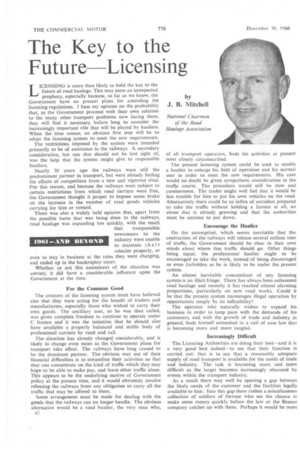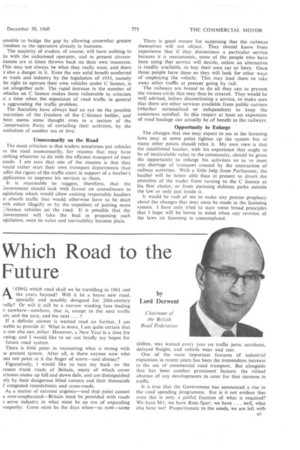The Key to the Future Licensing
Page 36

Page 37

If you've noticed an error in this article please click here to report it so we can fix it.
by J. B. Mitchell
LICENSING is more than likely to hold the key to the future of road haulage. This may seem an unexpected prophecy, especially because, so far as we know, the Government have no present plans for amending the licensing regulations. I base my opinion on the probability that, as the Government proceed with their own solution to the many other transport problems now facing them, they will find it necessary before long to consider the increasingly important role that will be played by hauliers. When the time comes, an obvious first step will be to adapt the licensing system to meet the new requirements.
The restrictions imposed by the system were intended primarily to be of assistance to the railways. A secondary consideration, but one that should not be lost sight of, was the help that the system might give to responsible hauliers.
Nearly 30 years ago the railways were still the predominant partner in transport, but were already feeling the effects of competition from a new and vigorous rival. For this reason, and because the railways were subject to certain restrictions from which road carriers were free, the Government thought it proper to impose some brake on the increase in the number of road goods vehicles carrying for hire or reward.
There was also a widely held opinion that, apart from the possible harm that was being done to the railways, road haulage was expanding too quickly, with the result that irresponsible newcomers to the industry were unable to maintain their vehicles properly, or even to stay in business at the rates they were charging, and ended up in the bankruptcy court.
Whether or not this assessment of the situation was correct, it did have a considerable influence upon the Government at the time.
MN. AND BEYOND
For the Common Good The creators of the licensing system must have believed also that they were acting for the benefit of traders and manufacturers, especially those who wished to carry their own goods. The ancillary user, as he was then called, was given complete freedom to continue to operate under C licence and it was the intention that he should also have available a properly balanced and stable body of professional carriers by road and rail.
The situation has already changed considerably, and is likely to change even more as the Government plans for transport take effect. The railways have long ceased to be the dominant partner. The obvious way out of their financial difficulties is to streamline their activities so that they can concentrate on the kind of traffic which they may hope to be able to make pay, and leave other traffic alone. This appears to be the underlying motive of Government policy at the present time, and it would obviously involve releasing the railways from any obligation to carry all the traffic that may be offered to them.
Some arrangement must be made for dealing with the goods that the railways can no longer handle. The obvious alternative would be a road haulier, the very man who, a2 of all transport operators, finds his activities at present most closely circumscribed.
The present licensing system could be used to enable a haulier to enlarge his field of operation and his normal user in order to meet the new requirements. His case would no doubt be given sympathetic consideration in the traffic courts. The procedure would still be slow and cumbersome. The trader might well feel that it would be less trouble for him to put his own vehicles on the road. Alternatively there could be an influx of outsiders prepared to take the traffic without holding a licence at all, an abuse that is already growing and that the authorities must be anxious to put down.
Encourage the Haulier On the assumption, which seems inevitable that the contraction of the railways will release several million tons of traffic, the Government should be clear in their own minds about where that traffic should go. Other things being equal, the professional haulier ought to be encouraged to take the work, instead of being discouraged or even forbidden as he is likely to be under the present system.
An almost inevitable concomitant of any licensing system is an illicit fringe. There has always been unlicensed road haulage and recently it has reached almost alarming proportions, particularly on new road works. Could it be that the present system encourages illegal operation by Opportunists simply by its inflexibility?
The operator who naturally wishes to expand his business in order to keep pace with the demands of his customers, and with the growth of trade and industry in general, finds himself enmeshed in a coil of case law that is becoming more and more tangled.
Increasingly Difficult The Licensing Authorities are doing their best—and it is a very good best indeed—to see that their function is carried out: that is to say that a reasonably adequate supply of road transport is available for the needs of trade and industry. The task is becoming more and more difficult as the target becomes increasingly obscured by events within the transport industry.
As a result there may well be opening a gap between the likely needs of the customer and the facilities legally available to him. Into this gap there rushes .a miscellaneous collection of soldiers of fortune who see the chance to make some money quickly before the law or the finance company catches up with them. Perhaps it would be more iensible to bridge the gap by allowing somewhat greater :reedom to the operators already in business. The majority of traders, of course, will have nothing to Jo with the unlicensed operator, and in present circum;lances are at times thrown back on their own resources. this may not always be what they really want, and there s also a danger in it. Even the one solid benefit conferred 3I1 trade and industry by the legislation of 1933, namely he right to operate their own vehicles under C licence, is tot altogether safe. The rapid increase in the number of rendes on C licence makes them vulnerable to criticism it a time when the expansion of road traffic in general s aggravating the traffic problem. The Socialists have always had an eye on the possible -estriction of the freedom of the C-licence holder, and here seems some thought even in a section of the :onservative Party of curtailing their activities, by the nstitution of another tax or levy.
Unnecessarily on the Road The main criticism is that traders sometimes put vehicles xi the road unnecessarily, for reasons that may have iothing whatever to do with the efficient transport of their ;oods. I am sure that one of the reasons is that they vould rather start their own transport departments than uffer the rigors of the traffic court in support of a haulier's ipplication to improve his services to them. It is reasonable to suggest, therefore, that the 3overnment should look with favour on amendments to egislation which would allow existing responsible hauliers o absorb traffic that would otherwise have to be dealt vith either illegally or by the expedient of putting more 2-licence vehicles on the road. It is possible that the 3overnment will take the lead in proposing such egislation, once its value and inevitability become plain. There is good reason for supposing that the railways themselves will not object. They should know from experience that if they discontinue a particular service because it is uneconomic, some of the people who have been using that service will decide, unless an alternative is readily available, to buy their own car or lorry. Once those people have done so they will look for other ways of employing the vehicle. This may lead them to take away other traffic at present going by rail. The railways are bound to do all they can to prevent the vicious circle that may thus be created. They would be well advised, before discontinuing a service, to make sure that there are other services available from public carriers (whether nationalized or independent) to keep the customers satisfied. In this respect at least an expansion of road haulage can actually be of benefit to the railways.
Opportunity to Enlarge The changes that one may expect to see in the licensing laws may at some point tighten up the system but at many other points should relax it. My own view is that the established haulier, with his experience that ought to be of incalculable value to the community, should be given the opportunity to enlarge his activities so as to meet any shortage of transport created by the contraction of railway activities. With a little help from Parliament, the haulier will he better able than at present to divert the attention of the trader from turning to the C licence as his first choice, or from pursuing dubious paths outside the law or only just inside it. It would be rash of me to make any precise prophecy about the changes that may soon be made in the licensing system. I have only tried to state some broad principles that I hope will be borne in mind when any revision of the laws on licensing is contemplated.




























































































